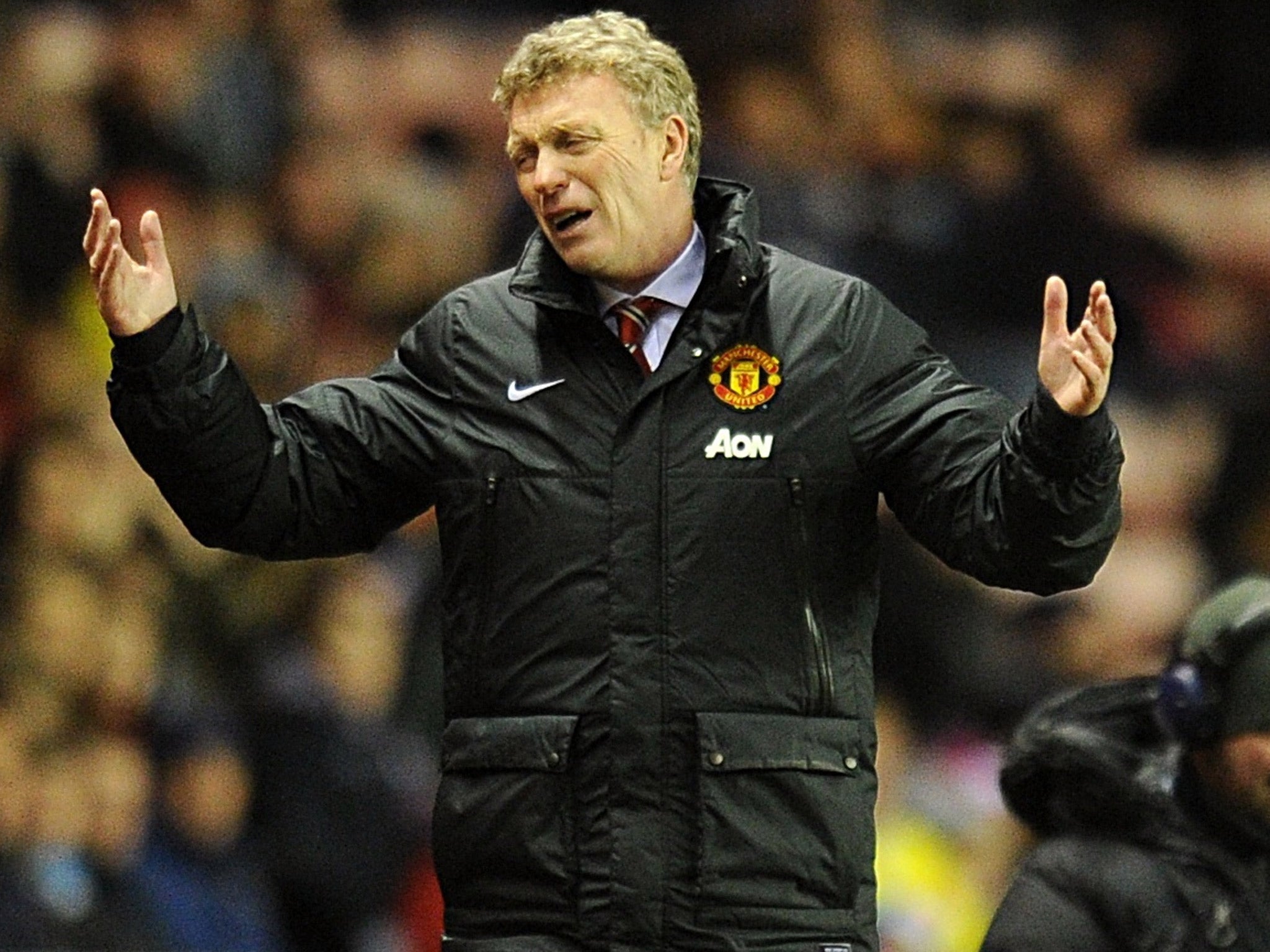Comment: Manchester United's fragility and despair was apparent after a minute of Capital One Cup defeat to Sunderland
David Moyes saw his side lost the first leg of the semi-final 2-1

Your support helps us to tell the story
From reproductive rights to climate change to Big Tech, The Independent is on the ground when the story is developing. Whether it's investigating the financials of Elon Musk's pro-Trump PAC or producing our latest documentary, 'The A Word', which shines a light on the American women fighting for reproductive rights, we know how important it is to parse out the facts from the messaging.
At such a critical moment in US history, we need reporters on the ground. Your donation allows us to keep sending journalists to speak to both sides of the story.
The Independent is trusted by Americans across the entire political spectrum. And unlike many other quality news outlets, we choose not to lock Americans out of our reporting and analysis with paywalls. We believe quality journalism should be available to everyone, paid for by those who can afford it.
Your support makes all the difference.Wes Brown and John O'Shea know the value the League Cup can bring to Manchester United when the walls are falling in on their season.
When they appeared for Sir Alex Ferguson in the final of the 2006 edition, Ruud van Nistelrooy was at war with the club and his omission from the Millennium Stadium showpiece was the main drama of the day. But O'Shea and Darren Fletcher were beginning to assert themselves as young professionals, Cristiano Ronaldo was waiting in the wings and Wayne Rooney was bursting into the big time. His two goals against Wigan Athletic in that final helped him to his first piece of silverware.
The United that Brown and O'Shea watched from their central defensive stations is changed utterly. Ferguson, chewing his lip under a maroon beret and seemingly unable to conjure words to say to Bryan Robson, found his decision to release the defenders momentarily vindicated.
Their collective muscle was unable to prevent Nemanja Vidic storming through them to head an equaliser. But nothing could mask another desperate staging post on the extraordinary fall of a club whose fans say will "never die" but which is doing precisely that.
If success in football were a measure of a collective desire to make an outcome happen, the United supporters would have had their team home.
The gloom around Wearside about Sunderland's dreadful inconsistency and apparent Premier League doom left their stadium echoing with emptiness, with only 32,000 of the 49,000 seats filled as the team sought overtures of 1973, the year of the Wembley Cup final which they have experienced only twice since.
It was the visiting fans – 4,000 of them – who filled the place with noise. They were singing about their 20 titles in the pubs two hours before kick-off and their noise rose to a crescendo as the acrid smell of the flares cut through the night air. In the way that these things often transpire, the full cacophony coincided with that Vidic equaliser.
But we all know that noise and desire is not enough. Those fans' team is written through with feelings of fragility and despair: that much was telegraphed from the 50th second, when Tom Cleverley cursed himself for his first mishit pass of another sub-standard night.
He was still shaking his head a full minute later. The weakness became emphatically apparent as a Sunderland side hardly buoyed by belief either took control. Ki-Sung yeung is building a reputation which was further enhanced here.
Moyes did not find the leaders he required after the ignominy of Sunday's FA Cup home defeat to Swansea. A sense of history was required; the sentiment that his players were damned if they would suffer their first three-match losing run since the one sustained at the end of the 2000-01 season – by a team that had already lifted the title.
It didn't come. Moyes' protestations about the winning penalty were hollow when his defence somehow conspired to allow Sebastian Larsson the chance of the night, unchallenged to shoot in the area.
Sunderland's struggle to blend the 13 summer signings – 12 foreign, the majority youthful and only five with previous Premier League experience – are proof that the money Moyes is being urged to spend can bring its difficulties. But Sunderland have a habit of yielding results against big clubs. They have now beaten Manchester City, Newcastle and Everton in the league; Chelsea and Manchester United in this cup. They had a sense of entitlement that United simply lacked.
United's chief executive, Ed Woodward, is willing to respond opportunistically in this month's transfer market to arrest this crisis, though generating those opportunities is the challenge. Football was a far less global place when Ferguson signed Henrik Larsson on loan in January 2007, after his chief scout Jim Lawlor had pointed out that it was a waste for the player to be plying his trade at Helsingborgs when he belonged on a bigger stage. When the Swedish club wouldn't sell, Ferguson asked Lawlor to ask about a loan. The same kind of creative thinking is required again.
Though the tie is not over, the positives for United are hard to summon up. Sunderland have no reason to fear Old Trafford in two weeks. And even if United can climb that mountain, Manchester City will probably lie in wait at Wembley. That could mean another public exposition of how far they have fallen.
Join our commenting forum
Join thought-provoking conversations, follow other Independent readers and see their replies
Comments